- Serbia
Get to know Serbia
- Citizens
Culture and science
Health services
Pension and disability insurance
- Business
Employment
Economy
- Media
- Government
- Contact
Keep in touch
Contact form
Back
Keepin touch
Whether you have a question, comment, suggestion or any problem in the purview of the government, send us your message and we will try to respond as soon as possible. If your problem is not in our purview, we will forward your message to the relevant institution.
Q:
A:
Markovic explains changes to set of public administration laws in parliament
Belgrade,
1 October 2007
Serbian Minister for Public Administration and Local Self-Government Milan Markovic said today in Serbian parliament, at the first session of parliament's regular sitting, that changes to the laws on government and public administration aim to harmonise these regulations with the new Serbian Constitution.
Markovic explained that a government member cannot be parliament member at the same time, deputy in the assembly of the autonomous province, member of the provincial executive council or of an executive organ of local self-government.
The changes also include change of the text of the oath which government members take before parliament, in line with the preamble of the new Constitution which prescribes that the Autonomous Province of Kosovo-Metohija is the integral part of Serbia.
With these changes, the government is given authority to supervise the constitutionality and legality of general acts of municipalities, towns and the city of Belgrade.
In line with the Constitution, the government can stop the enforcement only of general acts of municipalities, towns and the city of Belgrade, within five days, but it cannot stop the enforcement of general acts of the autonomous province.
The government member is obliged to abide by regulations on the conflict of interests in performance of public functions.
The Minister explained that the changes specify deadlines for the election, and termination of the government's mandate. The government whose mandate has ended can perform only the current tasks and cannot propose laws and other general acts to parliament, and it cannot pass regulations, unless it is a question of a deadline or a state need, or in the interest of defence of the state, or a natural and technical disaster.
The changes envisage that the number of parliament members who can propose to parliament the no-confidence vote on the government be increased from the present 20 to 60.
Markovic explained that lack of confidence in the government is voted by majority of votes of the total number of parliament members, and the same deadlines refer to the proposal for voting lack of confidence in the prime minister and ministers.
When it comes to changes to the Law on public administration, the government is allowed to supervise only the decisions made by organs of autonomous provinces, but not other general acts. Another new element is that a state secretary cannot be parliament member.
Changes to the Law on public and other holidays stipulate that public holidays in Serbia are New Year (January 1 and 2), Labour Day (May 1 and 2) and Victory Day (May 9).
Another public holidays are Sretenje (the Statehood Day, February 15), the first day of Christmas (January 7), as well as Easter holidays, starting from Good Friday until the second day of Easter.
The changes also include change of the text of the oath which government members take before parliament, in line with the preamble of the new Constitution which prescribes that the Autonomous Province of Kosovo-Metohija is the integral part of Serbia.
With these changes, the government is given authority to supervise the constitutionality and legality of general acts of municipalities, towns and the city of Belgrade.
In line with the Constitution, the government can stop the enforcement only of general acts of municipalities, towns and the city of Belgrade, within five days, but it cannot stop the enforcement of general acts of the autonomous province.
The government member is obliged to abide by regulations on the conflict of interests in performance of public functions.
The Minister explained that the changes specify deadlines for the election, and termination of the government's mandate. The government whose mandate has ended can perform only the current tasks and cannot propose laws and other general acts to parliament, and it cannot pass regulations, unless it is a question of a deadline or a state need, or in the interest of defence of the state, or a natural and technical disaster.
The changes envisage that the number of parliament members who can propose to parliament the no-confidence vote on the government be increased from the present 20 to 60.
Markovic explained that lack of confidence in the government is voted by majority of votes of the total number of parliament members, and the same deadlines refer to the proposal for voting lack of confidence in the prime minister and ministers.
When it comes to changes to the Law on public administration, the government is allowed to supervise only the decisions made by organs of autonomous provinces, but not other general acts. Another new element is that a state secretary cannot be parliament member.
Changes to the Law on public and other holidays stipulate that public holidays in Serbia are New Year (January 1 and 2), Labour Day (May 1 and 2) and Victory Day (May 9).
Another public holidays are Sretenje (the Statehood Day, February 15), the first day of Christmas (January 7), as well as Easter holidays, starting from Good Friday until the second day of Easter.
-
 Belgrade, 4 January 2026
Belgrade, 4 January 2026Violation of UN Charter has become dominant principle of contemporary politics
-
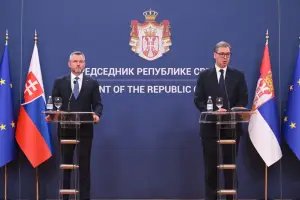 Belgrade, 21 December 2025
Belgrade, 21 December 2025Strengthening cooperation with Slovakia in many areas
-
 Belgrade, 21 December 2025
Belgrade, 21 December 2025President of Slovakia ceremonially welcomed in front of Palace of Serbia
-
 Belgrade, 18 December 2025
Belgrade, 18 December 2025Vučić welcomes President of Georgia in front of Palace of Serbia
-
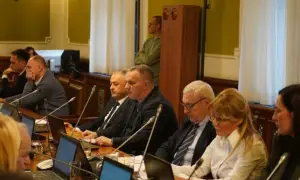 Belgrade, 15 December 2025
Belgrade, 15 December 2025Serbia needs strong, stable education system
-
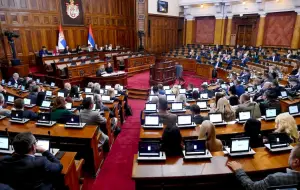 Belgrade, 3 December 2025
Belgrade, 3 December 2025Parliament adopts 2026 budget
-
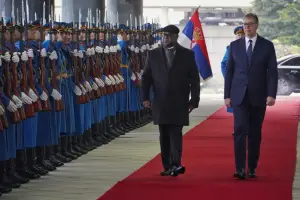 Belgrade, 28 November 2025
Belgrade, 28 November 2025Serbian President welcomes President of DR Congo
-
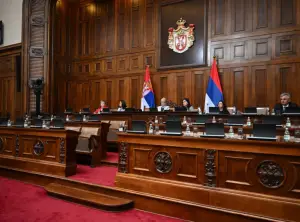 Belgrade, 7 November 2025
Belgrade, 7 November 2025Parliament adopts multiple laws
-
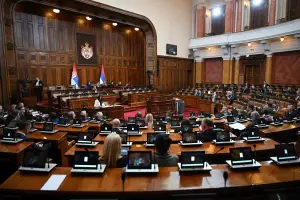 Belgrade, 22 October 2025
Belgrade, 22 October 2025Parliament adopts several laws, ratifies multiple international agreements
-
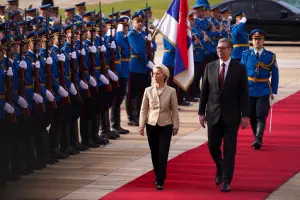 Belgrade, 15 October 2025
Belgrade, 15 October 2025Vučić welcomes Ursula von der Leyen in front of Palace of Serbia
